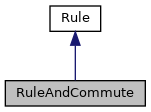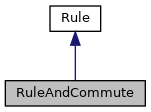Commute INT_AND with INT_LEFT and INT_RIGHT: (V << W) & d => (V & (W >> c)) << c
More...
Inheritance diagram for RuleAndCommute:

Collaboration diagram for RuleAndCommute:

Public Member Functions | |
| virtual Rule * | clone (const ActionGroupList &grouplist) const |
| Clone the Rule. More... | |
| virtual void | getOpList (vector< uint4 > &oplist) const |
| List of op codes this rule operates on. More... | |
| virtual int4 | applyOp (PcodeOp *op, Funcdata &data) |
| Attempt to apply this Rule. More... | |
 Public Member Functions inherited from Rule Public Member Functions inherited from Rule | |
| Rule (const string &g, uint4 fl, const string &nm) | |
| Construct given group, properties name. More... | |
| bool | checkActionBreak (void) |
| Check if an action breakpoint is turned on. More... | |
| virtual void | reset (Funcdata &data) |
| Reset this Rule. More... | |
| virtual void | resetStats (void) |
| Reset Rule statistics. More... | |
| virtual void | printStatistics (ostream &s) const |
| Print statistics for this Rule. More... | |
Additional Inherited Members | |
 Public Types inherited from Rule Public Types inherited from Rule | |
| enum | typeflags { type_disable = 1, rule_debug = 2, warnings_on = 4, warnings_given = 8 } |
| Properties associated with a Rule. More... | |
Detailed Description
Commute INT_AND with INT_LEFT and INT_RIGHT: (V << W) & d => (V & (W >> c)) << c
This makes sense to do if W is constant and there is no other use of (V << W) If W is not constant, it only makes sense if the INT_AND is likely to cancel with a specific INT_OR or PIECE
Member Function Documentation
◆ applyOp()
◆ clone()
|
inlinevirtual |
◆ getOpList()
|
virtual |
The documentation for this class was generated from the following files:
- ruleaction.hh
- ruleaction.cc
 1.8.17
1.8.17